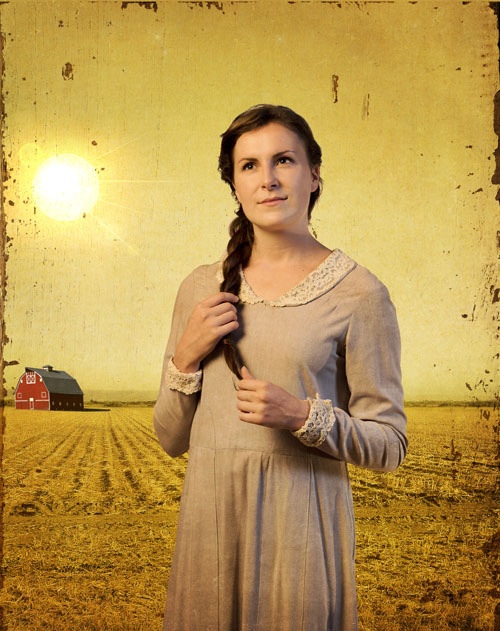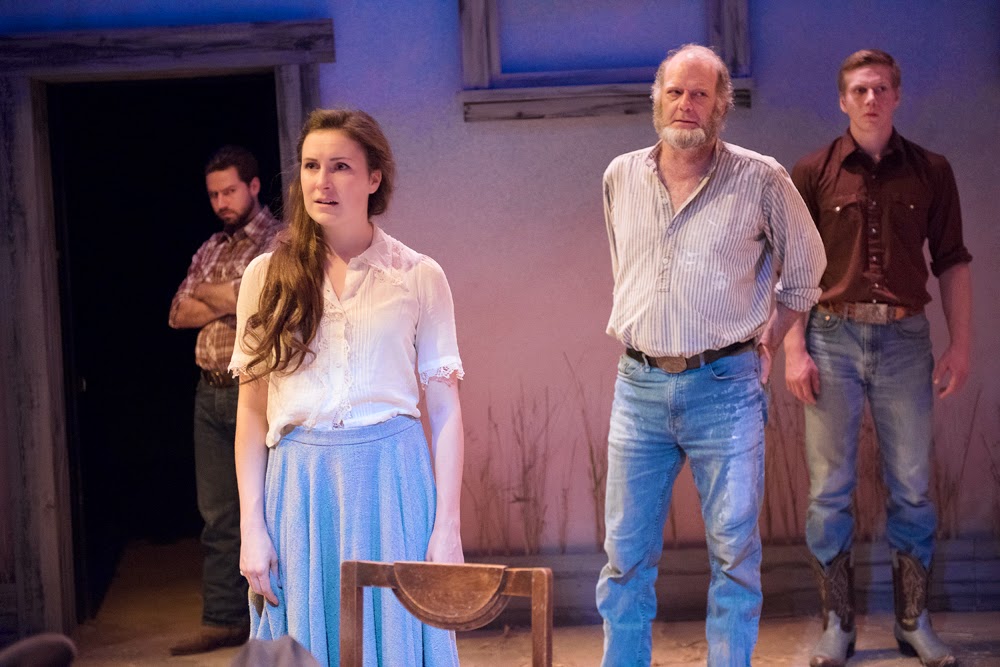
Credit: Emily Cooper
At Pacific Theatre until November 1, 2014
604-731-5518/pacifictheatre.org
Posted October 11, 2014
Predictability usually kills a play but in The Rainmaker predictability is as comforting as homemade pumpkin pie. You know Lizzie is going to get a man, you know the rainmaker is a conman and, shucks, you know it’s gonna rain. The play goes where our hearts want it to go; it’s just a matter of how long it takes to get there and what surprises we might meet along the way.
And that’s another thing: it takes a hundred and forty-five minutes with two intermissions to get there but who cares because director Ron Reed and this terrific cast keep this prairie romance at a quick trot.
My guest, a prairie boy from Alberta, commented on three things: the Stetsons aren’t battered enough, white Stetsons are only worn on Sundays, the men’s’ jeans aren’t dirty enough and, dammit, Lizzie (Pippa Johnstone) just is not plain. She’s pretty, alright – even with her hair yanked primly back. Any guy can see that.
Those of us west of the Rockies don’t twig to these ranch hand details which, nevertheless, didn’t ruin my guest’s enjoyment of The Rainmaker – he was just, you know, saying.

Credit: Emily Cooper
Written by American playwright N. Richard Nash in the early 50s, the play is set in drought-plagued Kansas in the 30s. Crops are withered, cattle are dying and there’s not a cloud in the sky. On top of that H.C. Curry, a weathered rancher (Andrew Wheeler) and his two sons Noah (Kenton Klassen) and Jim (Ryan Scramstad) are coming to the realization that Lizzie, the boys’ twenty-something sister, is doomed to become an old maid. She’s sensible, would make a feller a fine wife but she’s been told so often by brother Noah that she’s plain, she believes it. The guys try to hook her up with the town deputy File (John Voth) but that only leads to painfully awkward moments between them.
Suddenly, Starbuck, a smooth-talking, charismatic stranger, swaggers through the door and promises, for an advance of $100, to make it rain. The whole family is turned upside down as if a tornado had driven through the place. He’s obviously, as Lizzie points out, “a liar and a conman” but H.C. Curry is a desperate man.
The writing is on this Kansas farmhouse walls; one hundred dollars are going to change hands.
While it’s obviously a lot of fun portraying a scoundrel, not everyone gets it right. Robert Salvador does: his Starbuck is a cocky, fast-talking con artist but Salvador lets us see Starbuck’s vulnerability, too. With two very successful brothers, Starbuck is the family loser. All he wants is to succeed at something, maybe settle down, stop running from town to town where, once revealed, he has to hit the road.
There’s lots of dry-as-dust humour with the banter between father and sons. As grizzled H.C., Wheeler (so different from his recent portrayal of Stephen Harper) is gruff and straight to the point as H.C. keeps pugnacious Noah and sweet, slightly simple Jim from beating on each other.

Credit: Emily Cooper
Johnstone, at the heart of this story, strikes a lovely balance between longing and resignation. We ache for Lizzie and, like her father and Jim, we don’t much care whether she goes off with Starbuck or hooks up with File.
Set design by John Webber is simple and effective: sash windows along the east and west walls, table and chairs, a doorframe. An interesting little metatheatrical device that director Reed uses is to slightly overlap the beginning of the next scene with a pair of stage hands still shifting the furniture. Just a little reminder that we are, indeed, in the theatre.
Drought. Not something we experience much in these parts. But drought in this play is emotional as well as actual. And when it finally rains, it sure as heck pours. Hallelujah.

